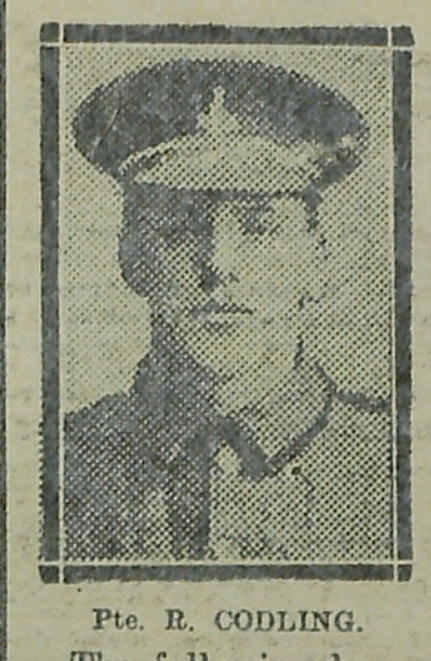
Robert Codling was the son of John and Elizabeth Codling of 13 Revesby Street, Tyne Dock, South Shields. At the outbreak of war he enlisted in the Yorkshire Regiment and was posted to the 8th Battalion.
19873 Private Codling arrived in France in September 1915 and was in and out of the lines in October, November and December. The 8th Battalion relieved the 10th West Riding Regiment in trenches at La Rolanderie on the 18th December. Robert was awarded the DCM for his actions on the 21st.
His citation reads, “For conspicuous gallantry near Rue du Bois on 21st December 1915, when under heavy fire and in the face of rifle grenades, he returned to a wounded comrade and brought him in. Later in the day he joined a patrol and searched under heavy fire for his platoon officer who had failed to return”.
On 13th October 1916, at the age of 21, he died of wounds. The battalion had been serving in the area of Contalmaison and had suffered a number of casualties. He is buried at Dernancourt Communal Cemetery Extension in the Somme.
Explore more memories from the ribbon
-
Richard Oliver
Richard Oliver was 22 years old when he enlisted at Cramlington in September 1914. He was from Esh Winning, Crook, Co. Durham and was a miner. He enlisted in the Northumberland Fusiliers but was posted to the Yorkshire Regiment. He served in the 9th and 10th Battalions and whilst with the 10th Battalion in 1915 he was awarded the Military Medal. He served in France and Italy and became disabled due to the effects of gassing. He was discharged in March 1920 and was initially given a pension of 8 shillings a week, but this was subsequently withdrawn and his appeal rejected. He left the army as a Corporal, he served in France from 1915 to 1917 and on the Italian Front from November 1917 until December 1918.
-
Jack Charlton
Sergeant John (Jack) Charlton joined the Army as a Territorial in 1908 when he enlisted in the 4th Battalion, Alexandra, Princess of Wales’ Own Yorkshire Regiment (The Green Howards). He served on the Western Front from April 1915 where he had a distinguished career, earning a Distinguished Conduct Medal and being Mentioned in Despatches in 1917. One particular act stands out from his memoirs which earned him a commendation from his Commanding Officer was while serving at the Arras Front while he was in charge of Battalion communications. After heavy shelling cut phone lines he used a Lucas Day Light Signalling Lamp to request an artillery barrage to defend the HQ from German gas shells. This Lamp was donated to the Museum and can be seen on display. Jack also suffered injuries during his service, firstly in April 1915 when he was gassed at Zillibeck and another, more serious gas attack got him sent home towards the end of 1917 where he remained for the rest of the War. While on Leave in 1916 Jack got engaged to Phillis Blow but they didn’t get married until 1918 after we was sent home. During 1918 he attended various training courses including a Signals Course at the Armoury School near Dunstable but before he was able to finish the Armistice was signed and so he was demobbed at Hornsea.
-
Henry Parker
Henry Parker In October 2015 the Green Howards Museum was contacted by the Ministry of Defence’s Joint Casualty and Compassionate Centre (JCCC). Human remains had been found in a field to the north- east of the village of Martinpuich on the Somme. The JCCC wanted to know if we could do anything to help identify this unknown soldier. We looked at events around Martinpuich between 25 and 27 September 1916. 77 men were lost, whilst an additional 319 Officers and Other Ranks were either wounded, or listed as ‘missing’. The remains could have belonged to any one of a potential 396 men. Through a process of elimination using research and archive information, we produced a shortlist of 12. To get any further, science needed to play its part. The Forensic team from JCCC collected DNA from the femur of the remains. DNA was taken from the next of kin of our shortlisted missing soldiers who had agreed to take part in the process. The remains were positively identified as those of 3183 Private Henry Parker, born 29th September 1893 in Weavererthorpe, in the Yorkshire Wolds. He was killed in action, aged 22, during the Battle of the Somme on 26 September 1916. Shoulder badges, uniform buttons, a belt buckle and clip, bullet and cut throet razor were found with the remains of Private Henry Parker – these are now on display at the museum. He was reburied with full military honours in Warlencourt Cemetary in France on 17th May 2017….
